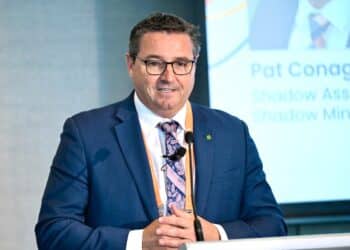Speaking last week at an annual function organised by Pritchitt Partners, executive director of The Ethics Centre, Dr Simon Longstaff, said commissioner Kenneth Hayne made it clear during the hearings that he is not simply looking for more legislation.
Rather, Mr Hayne requires that the existing rules be applied and expects the industry to choose an ethical standard that keeps it well within the bounds of the law.
Commenting on the behaviour of executives in financial services, Dr Longstaff said that this is not an industry populated by monsters, or full of wicked individuals asking, ‘How can I do something terrible today?’.
“These are invariably good people led by institutional arrangements to do bad things,” he told the audience.
“During the commission’s hearings, we have heard deeply troubling stories that now define, in the public mind, the conduct of organisations and a whole industry. It does not matter that the incidents of egregiously bad behaviour were relatively few in type. Like the sting at the tip of a scorpion’s tail, they have caused massive damage.”
Dr Longstaff noted that banks have recognised for a long time that the community has labelled them as greedy and perhaps a bit nasty.
However, he thought that a Rubicon has been crossed and banks and other financial institutions are perceived as being dishonest, and has created a huge challenge for the financial services organisations to respond to these circumstances.
“It cannot be fixed by being better than competitors at such things as service or product design, and getting all the nuts and bolts right,” Dr Longstaff said.
“More than that is required. It all comes back to principled behaviour.”
Dr Longstaff said that commissioner Hayne’s comments imply that he wants the industry to be ethical, and to not merely to be compliant for fear of being discovered and punished.
Further, he said that’s why The Ethics Centre hopes there will be a surge in engagement with the Banking and Finance Oath that has been long neglected by large parts of the industry, and sets an ethical framework of precisely the kind needed to address the issues identified by commissioner Hayne.
“If the industry understands its purpose and the standards and principles that underpin it, and acts on them, it will be able to navigate all the legal shoals it might encounter. It will have a compass and a purpose that will help achieve ends other people will accept as reasonable,” Dr Longstaff said.
“With some failing to see this – cutting corners because, technically, it’s allowed – the industry has ended up in the position it now finds itself.”
Finally, Dr Longstaff warned that organisations can’t adopt ethics simply to help the bottom line.
“If you do it for the dividend, you won’t get the dividend. It’s not a Pollyanna-world where every ethical decision is met with instant rewards. It’s a case of being ethical for its own sake. The rewards of trust only flow to the trustworthy.”




I have stated this many times, the issue is not compliance, but legislation that is passed it use by date. We no longer have commissions, The industry has changed, no longer is it based on sales people selling financial products. We really need a re write so those advisers that want to advise and service clients can do so in an efficient cost effective manner. Hope Hayne bans Life commissions the area left that incentivises the sale of a product.
Ian Bailey…your comments regarding the banning of Life Insurance commissions indicate a lack of understanding, ignorance,negligence, or all 3 combined.
Your comments indicate you firmly believe that charging a fee for service eradicates a conflict of interest or elevates ethics and nothing could be further from the truth.
These comments are highly irresponsible.
Agree Ian.
It would be good if for those of us that don’t work on a commission there was a way that we could do so without having layer after layer of red tape put in place to ‘safeguard’ the client. All it does is pushes the cost of advice out of reach of most people. Unfortunately the educated boffins in Treasury don’t look at it from this side.
Did you really believe it has all been about removing conflict and now that you do fees rather than commission you want an pat on the back – silly you. It is about getting rid of Financial Advisers – has never been about anything else. Think about it – when did you hear comments about the product providers % based fees, the Industry Funds charge % based fees and everyone a fee for advice they provide to a few, ASIC charges fees and to every issues that they have failed at, receive more $ and power. Really, $70 Million to have someone within AMP, CBA, WBC, NAB and CBA. Now that is a good earner.
I understand your point, but we are trying to please a master that will simply change the rules once you have complied – no matter how hard you try.
Those advisers that don’t work on commission benefit from the ASIC gift of being allowed to advertise themselves as “independent”. They can hide behind this regulatory inconsistency even if they receive fee based conflicted remuneration.
Happy for you to explain how we receive conflicted remuneration.
You’re right Ian, the industry has moved on. To the point where the biggest incentivised product sale now is SMSFs. Nearly everyone needs insurance, and all the decent quality insurers pay exactly the same commission rate. But very few people actually need an SMSF.
Any firm that recommends an SMSF then uses an inhouse service or related company to administer that SMSF is receiving conflicted remuneration. In most cases they are also violating the Best Interests Duty. We all know the majority of firms involved in this scam are accountants. Accountants are not actually subject to BID, and seem to benefit from a “no enforcement” approach in relation to other financial advice laws. But there seems to be a lot of foolish financial planners trying to join in the accountants’ SMSF scam, and we all know who ASIC will target first when they eventually figure out what’s happening.
Another planner who doesn’t write risk (not according to your website) that wants to ban the big bad life insurance commission.Spare me.
ENOUGH IS ENOUGH
The Royal Commission report is due to be released on Monday and we need to stand up for all Financial Advisers and our Industry. The fallout from the Royal Commission will have far-reaching affects and many unintended detrimental consequences for Advisers and their clients.
We need an Adviser Advocacy and Government Lobbying group now!
The foundation members of the LICG are forming a new association:
The United Financial Advisers Association (UFAA).
Join the UFAA Now
is UFAA real or is it the same as The Royal Chartered Association of Associated Advisory Professionals (RCAAAP)?
the RCAAAP is very real. we are raising $500,000 AUD to apply for royal charter so we can skip the Australian law and have direct access to appeal to the privy council.
OMG yet another group… enough already
Although I agree with much of the sentiment, I suspect that Dr Longstaff is too conflicted to provide an objective view. Compliance should be focused on ethical conduct and the obligation to “act efficiently, honestly and fairly”. This is what the law requires and Justice Hayne emphasised. I would be cautious in assuming that engaging an ‘ethics expert’ will, in and of itself, deliver any lasting conduct changes.
The industry bodies has destroyed the futures of thousands of Australian investors and retirees along with hundreds of not thousands of Financial Advisers/Planners.
They have made compliance a circus, a law firms whale carcass to feed off making advice too expensive and too difficult to comply.
Advisers can not afford to see the very people that need advice and are too afraid to recommend “real” advice to larger clients opting for safe as possible strategies like life annuities when interest rates are at record lows.
This ridiculous circus needs to be changed. The industry bodies like the FPA need to be abolished and booted out of power. You can’t have Dracula looking after a blood bank.
The FPA have destroyed this once great industry. They forgot who to represent with their sole focus on fees, courses and membership. Rid the industry of the like of the FPA and even the AFA and watch the industry thrive again and people get valued advice that is affordable.
LICG is the answer
ENOUGH IS ENOUGH
The Royal Commission report is due to be released on Monday and we need to stand up for all Financial Advisers and our Industry. The fallout from the Royal Commission will have far-reaching affects and many unintended detrimental consequences for Advisers and their clients.
We need an Adviser Advocacy and Government Lobbying group now!
The foundation members of the LICG are forming a new association:
The United Financial Advisers Association (UFAA).
Join the UFAA Now
Maybe wait until the report comes out before you say that it will have unintended detrimental consequences.
Good luck Donald, but I don’t want to fight to keep things as they were. I want change to make it a more respected industry. If these means accepting a few things I don’t think are good, then so be it.
Once great industry…..when was the industry great for clients???
The 95% that did the right thing…their clients benefitted greatly.
So did the advisers, lots of commissions and lots of entry/exit fees. Disgraceful